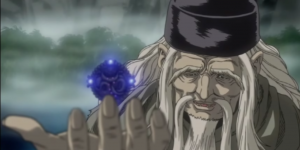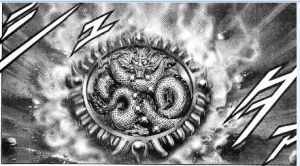The Taoist: Difference between revisions
Appearance
No edit summary |
No edit summary |
||
| Line 2: | Line 2: | ||
: A mystical old fortune teller, who appears time to time out of nowhere to talk to (or sometimes taunt) [[Kenshirō Kasumi]]. Other people may or may not notice his appearance or existence, as he seems to possess some kind of mysterious ability to make bystanders forget about him. He gave a "fate medallion" to Kenshiro as a [[wikipedia:coin flip|flip coin]] to help him make a decision when facing a serious dilemma. He also grants worthy people connected to the Hokuto clan a wish about their fate much like the time he briefly extended [[Máng Kuáng-Yún]]'s life so that he could fulfill his wish to battle Kenshiro. | : A mystical old fortune teller, who appears time to time out of nowhere to talk to (or sometimes taunt) [[Kenshirō Kasumi]]. Other people may or may not notice his appearance or existence, as he seems to possess some kind of mysterious ability to make bystanders forget about him. He gave a "fate medallion" to Kenshiro as a [[wikipedia:coin flip|flip coin]] to help him make a decision when facing a serious dilemma. He also grants worthy people connected to the Hokuto clan a wish about their fate much like the time he briefly extended [[Máng Kuáng-Yún]]'s life so that he could fulfill his wish to battle Kenshiro. | ||
: He meets Kenshiro the second time in a bar after the defeat of [[Jean Carné]] and tells him that there are still many strong warriors in China. The third time was in a temple after Kenshiro learned that the bandit leader was [[Pān Yù-Líng]]. The fourth time was after Kenshiro's brief encounter with [[Biāo Bái-Fèng]]. The Taosit would also reveal himself to Yù-Líng in the church after her brother barely survived an assassination attempt and [[Liú Zōng-Wǔ]] after arriving in Shanghai. | : He meets Kenshiro the second time in a bar after the defeat of [[Jean Carné]] and tells him that there are still many strong warriors in China. The third time was in a temple after Kenshiro learned that the bandit leader was [[Pān Yù-Líng]]. The fourth time was after Kenshiro's brief encounter with [[Biāo Bái-Fèng]]. The fifth time was after Kenshiro's initial encounter with [[Liú Zōng-Wǔ]]. The Taosit would also reveal himself to Yù-Líng in the church after her brother barely survived an assassination attempt and [[Liú Zōng-Wǔ]] after arriving in Shanghai. | ||
: The Taoist's identity and agenda were never explicitly revealed, but many Japanese fans speculate him to be '''Běidǒu Xīngjūn''' ([[wikipedia:ja:北斗星君|北斗星君]] ''Hokuto Seikun''), Taoist god of the [[Big Dipper]]. | : The Taoist's identity and agenda were never explicitly revealed, but many Japanese fans speculate him to be '''Běidǒu Xīngjūn''' ([[wikipedia:ja:北斗星君|北斗星君]] ''Hokuto Seikun''), Taoist god of the [[Big Dipper]]. | ||
Revision as of 13:19, 25 May 2013


"The Taoist" (道士 Dōshi) Error creating thumbnail: /bin/bash: line 1: convert: command not found (c.v. Masaru Ikeda)
- A mystical old fortune teller, who appears time to time out of nowhere to talk to (or sometimes taunt) Kenshirō Kasumi. Other people may or may not notice his appearance or existence, as he seems to possess some kind of mysterious ability to make bystanders forget about him. He gave a "fate medallion" to Kenshiro as a flip coin to help him make a decision when facing a serious dilemma. He also grants worthy people connected to the Hokuto clan a wish about their fate much like the time he briefly extended Máng Kuáng-Yún's life so that he could fulfill his wish to battle Kenshiro.
- He meets Kenshiro the second time in a bar after the defeat of Jean Carné and tells him that there are still many strong warriors in China. The third time was in a temple after Kenshiro learned that the bandit leader was Pān Yù-Líng. The fourth time was after Kenshiro's brief encounter with Biāo Bái-Fèng. The fifth time was after Kenshiro's initial encounter with Liú Zōng-Wǔ. The Taosit would also reveal himself to Yù-Líng in the church after her brother barely survived an assassination attempt and Liú Zōng-Wǔ after arriving in Shanghai.
- The Taoist's identity and agenda were never explicitly revealed, but many Japanese fans speculate him to be Běidǒu Xīngjūn (北斗星君 Hokuto Seikun), Taoist god of the Big Dipper.
